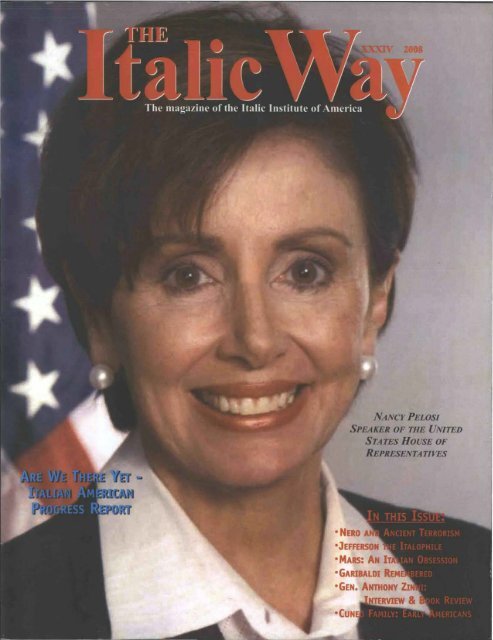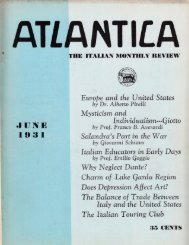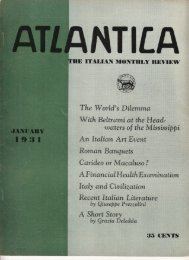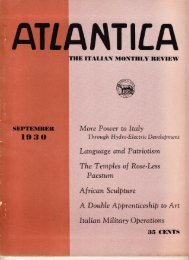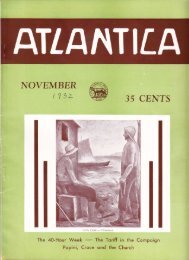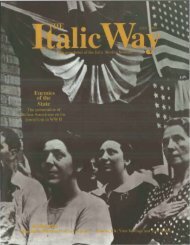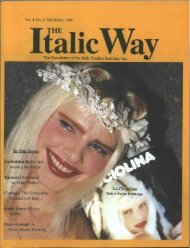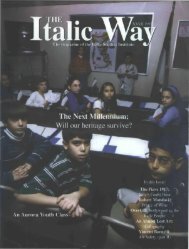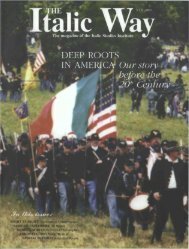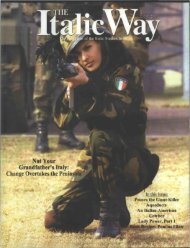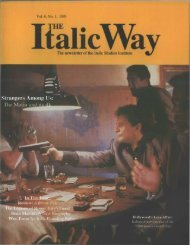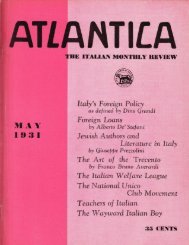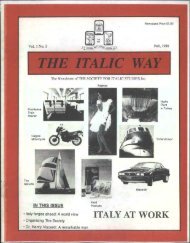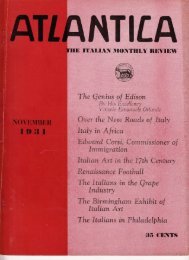nancy pelosi speaker of the united states house - Italic Institute of ...
nancy pelosi speaker of the united states house - Italic Institute of ...
nancy pelosi speaker of the united states house - Italic Institute of ...
Create successful ePaper yourself
Turn your PDF publications into a flip-book with our unique Google optimized e-Paper software.
NANCY PELOSI<br />
SPEAKER OF THE UNITED<br />
STATES HOUSE OF<br />
REPRESENTATIVES
2<br />
EVERYBODY IS 'ITALIAN'<br />
Don't begrudge Irish Americans if <strong>the</strong>y seize an opportunity. When <strong>the</strong><br />
producers <strong>of</strong> The Sopranos wanted to "ltalianize" <strong>the</strong> New Jersey business<br />
district where Tony and gang had <strong>the</strong>ir fictional headquarters, <strong>the</strong>y<br />
asked <strong>the</strong> Irish-American Association next door to replace <strong>the</strong>ir Irish<br />
flag with an Italian one. Switching sides earned <strong>the</strong> Old Sodders<br />
$20,000 from HBO. Hoist one for Tony! Where do Italian American<br />
groups sign up for <strong>the</strong> gravy train?<br />
GOINGS ON<br />
Courageous Stand<br />
One phase <strong>of</strong> Bill's promotional tour for <strong>the</strong> new documentary took him to<br />
Springfield, lllinois and a quick visit with President Lincoln at <strong>the</strong> Lincoln<br />
Museum. Bill is seen here with <strong>the</strong> late Lincoln family and Museum Director Tom<br />
Schwartz (<strong>the</strong> live one in <strong>the</strong> middle). Italian American historian Dom Candeloro,<br />
who coordinated <strong>the</strong> screening is to <strong>the</strong> right <strong>of</strong> <strong>the</strong> former president.<br />
realize<br />
Tony and friends are <strong>of</strong> Italian extraction, <strong>the</strong> show gives<br />
<strong>the</strong>m a subtle hint.<br />
When his middle school in Batavia, illinois, did a cast call for an original play penned by a faculty<br />
member, 13-year-old Johnny Levato took <strong>the</strong> script home to show his mom. Actually, it<br />
wasn't so original. It was a Sopranos parody for school children, loaded with Italian stereotypes.<br />
When mom Marina objected to school <strong>of</strong>ficials she made enemies fast. When she went<br />
to court to stop <strong>the</strong> play she became a community pariah. The court said it was just freedom<br />
<strong>of</strong> speech, not a protection <strong>of</strong> minors issue, even if a student did not write <strong>the</strong> play and <strong>the</strong> adult<br />
teacher coached <strong>the</strong>m to do Italian stereotypes. Marina and Johnny lost <strong>the</strong>ir battle and Johnny<br />
enrolled in a private school. Here, our Vice Chairman, Midwest, Don Fiore, presents Marina<br />
and Johnny with <strong>the</strong> <strong>Italic</strong> <strong>Institute</strong>'s highest award, <strong>the</strong> Silver Medallion, for <strong>the</strong>ir courageous<br />
defense <strong>of</strong> <strong>the</strong> Italian heritage. With <strong>the</strong> award came $1,000 for Johnny's tuition.<br />
Travels With Bill<br />
Our globe-trekking vice president Bill Dal Cerro accomplished quite a lot in 2007. His biggest<br />
coup was seeing <strong>the</strong> completion <strong>of</strong> our joint-venture documentary And They Came to Chicago.<br />
Bill conceived <strong>the</strong> project and opened <strong>the</strong> doors for co-producer Modio Media. Here Bill (r) is<br />
with Dan Soles <strong>of</strong> Chicago's WITW (l)and Larry Wert (c) <strong>of</strong> NBC affiliate Channel 5. This<br />
70-minute saga <strong>of</strong><strong>the</strong> Italian presence in Chicagoland was shown on both public and commercial<br />
television, a rare feat. The <strong>Italic</strong> <strong>Institute</strong> has now produced three pr<strong>of</strong>essional documentaries<br />
on <strong>the</strong> Italian heritage.<br />
Winging his way to Italy, Bill met with newly elected<br />
Senator Renato Turano (left photo), <strong>the</strong> first representative<br />
from America in <strong>the</strong> Italian Parliament. Senatore<br />
Turano's company, Turano Bakery <strong>of</strong> Chicago, donated<br />
$10,000 to And They Came to Chicago.<br />
While in Rome, Bill also met with Darius Arya <strong>of</strong> <strong>the</strong><br />
American <strong>Institute</strong> <strong>of</strong> Roman Culture. Our adopted monument,<br />
<strong>the</strong> Altar <strong>of</strong> Augustan Peace, was <strong>the</strong> subject <strong>of</strong> discussion.<br />
The <strong>Italic</strong> Mzy
Nefertiti Gets A Race Job<br />
Lenox, <strong>the</strong> famous New Jersey china manufacturer,<br />
is dabbling in historical revisionism<br />
to expand its market. A new product, a<br />
reproduction <strong>of</strong> Nefertiti, <strong>the</strong> Sun Queen,<br />
takes some historical liberties. Lenox has<br />
singlehandedly, and maybe underhandedly,<br />
mutated Nefertiti from a Hametic Caucasian<br />
into a sub-Saharan Negroid in a blatant marketing<br />
ploy. Note <strong>the</strong> dissimilarities in <strong>the</strong><br />
original Egyptian bust <strong>of</strong> Nefertiti and her<br />
mummy with Caucasian hair to <strong>the</strong> new and<br />
improved Lenox version. There is a disclaimer,<br />
<strong>of</strong> course:" Nefertiti is Lenox's interpretation <strong>of</strong> this noble figure." We bate to step on anyone's dreams, but no good can come<br />
<strong>of</strong> this crass manipulation <strong>of</strong> facts. It falls into <strong>the</strong> same racism that gives Romans characters British accents in <strong>the</strong> movies.<br />
The Italian Way<br />
The world's first super highway was opened in ItaJy between Milan and Varese on September<br />
21, 1924. ft was a toll road built by <strong>the</strong> national government that eventually linked up with o<strong>the</strong>r<br />
autostrade into a nationaJ highway system. ItaJy pioneered this concept. It had all <strong>the</strong> hallmarks<br />
<strong>of</strong> today's superhighways: rest stops, service stations and police patrols. Tolls varied by vehicle<br />
type and <strong>the</strong>re was a surcharge for vehicles that didn't have pneumatic rubber tires (Wagons,<br />
Ho !). Atlantica Magazine, an upscale Italian American journal, had this to say about Italy's preeminence<br />
in its April, 1931 issue:<br />
These new italian "autostrade" have aroused <strong>the</strong> admiration <strong>of</strong> <strong>the</strong> world, and what is more,<br />
imitation, "<strong>the</strong> sincerest form <strong>of</strong> flattery. '' In Germany and France, for example, committees for<br />
that purpose have been formed, <strong>of</strong>ten with <strong>the</strong> aid <strong>of</strong> Italian engineers and experts. And in<br />
Spain, Portugal, Egypt and Argentina movements are underway to adopt <strong>the</strong> "autostrada" system after <strong>the</strong> Italian fashion. The movement<br />
is gaining strength, and it is not too much to say that before long <strong>the</strong>se "autostrade" may be destined to replace old automobile roads in<br />
practically all <strong>the</strong> civilized countries <strong>of</strong> <strong>the</strong> world, especiafly <strong>the</strong> United States, with heavy automobile traffic.<br />
The American motorist will appreciate what it would mean for his driving comfort and enjoyment to substitute, for his customary snails<br />
pace Sunday drive along clogged roads, with <strong>the</strong> many stops at intersections, <strong>the</strong> constant care exercised to avoid pedestrians or cars ahead<br />
which stop suddenly, etc. - a drive along wide smooth-paved concrete roads, with no slow traffic to impede his enjoyment, and with plenty<br />
<strong>of</strong> opportunities for occasionally - and safely-"stepping on <strong>the</strong> gas. "<br />
Rudy Berated<br />
This political cartoon accompanied an op-ed piece in September II th's Newsday written by our<br />
own Rosario laconis, Vice Chairman, East. Rosario took presidential contender Rudy Giuliani to<br />
task for turning his heritage into a running mafia gag with imitations <strong>of</strong> Marlon Brando's<br />
Godfa<strong>the</strong>r and sprinkling interviews with mob jargon. In true American fashion, Rosario advised<br />
ltalo voters not to support Rudy solely on <strong>the</strong> basis <strong>of</strong> ethnic pride.<br />
If They Only Knew ...<br />
Back in 1933, <strong>the</strong>re was an exchange <strong>of</strong> opinions regarding <strong>the</strong> question <strong>of</strong> Italian American youth. Peter Sammartino, who later founded<br />
Fairleigh Dickenson University in New Jersey, feared that much <strong>of</strong> <strong>the</strong> second generation <strong>of</strong> Italian Americans was not adjusting well to<br />
American society because <strong>of</strong> an inferiority complex. He did not go into detail but surely being caught between a non-English speaking first<br />
generation and American prejudice was part <strong>of</strong> <strong>the</strong> problem. His solution was principally to "make <strong>the</strong> younger people feel <strong>the</strong> richness <strong>of</strong><br />
<strong>the</strong> cultural heritage <strong>of</strong> <strong>the</strong>ir racial stock." In short, he preached Italian studies for <strong>the</strong> younger generation. Not everyone agreed with<br />
Sammartino. Here is one rebuttal:<br />
"Perhaps our good friend [Sammartino] had in mind those early days <strong>of</strong> Italian immigration when Italians were called 'wops'<br />
and 'guineas' by loud-mou<strong>the</strong>d Irishmen, eta/. Under such deplorable circumstances it is easy to see how many Italians and <strong>the</strong>ir<br />
progeny might have suffered inferiority complexes. But happily, we are now living in an era where Italy and Italians [including<br />
ItaJo-Americans] are rapidly becoming synonyms for distinction and culture."<br />
XXXIV; 2008 3
Anita Roddick, 64, <strong>the</strong> British founder <strong>of</strong><br />
_ The Body Shop chain and outspoken advocate<br />
for <strong>the</strong> environment and animal rights,<br />
was born Anita Lucia Perilli. Her cosmetic<br />
chain eventually numbered 2,000 stores in<br />
fifty countries. But, <strong>the</strong>y were a means to<br />
nobler ends. She sc<strong>of</strong>fed at <strong>the</strong> idea <strong>of</strong> rejuvenating<br />
cosmetics and used her eoonnous<br />
pr<strong>of</strong>its on behalf <strong>of</strong> saving rain forests, aiding<br />
<strong>the</strong> impoverished, protecting animals,<br />
defending voting rights and a myriad <strong>of</strong><br />
o<strong>the</strong>r good works.<br />
Anacleto Angelini, 93, Chilean entrepreneur who emigrated from<br />
ltaly in 1948. He built Chile's largest forestry company, Empresas<br />
Copec, and had a personal fortune <strong>of</strong>$6 billion, making him Chile's<br />
wealthiest man.<br />
Frank Balzano, 75, encyclopedia entrepreneur who began his<br />
career with World Book Encyclopedia and retired as president <strong>of</strong><br />
Compton's Encyclopedia just before <strong>the</strong> home computer age. In<br />
1971, he created <strong>the</strong> first "precyclopedia" for pre-school children.<br />
ARMS AND THE MAN. o o<br />
In an Italian American first, both <strong>the</strong> Chairman and Vice Chairman<br />
<strong>of</strong> <strong>the</strong> Joint Chiefs <strong>of</strong> Staff were paesani. General Peter Pace and<br />
General Peter Chiarelli in Iraq,<br />
above, and General Claudio<br />
Graziano, below, In Lebanon<br />
Admiral Edmtmd Giambastiani served<br />
<strong>the</strong> nation through much <strong>of</strong> tbe Iraq<br />
War. Both retired this year. The U.S.<br />
military is well stocked with Italian<br />
American leaders including General<br />
Raymond Odiemo, whose 4th Infantry<br />
Division captured Saddam Hussein, and<br />
General Peter Chiarelli who has advocated<br />
<strong>the</strong> pacification <strong>of</strong> Iraq through<br />
extensive public works projects.<br />
Elsewhere in <strong>the</strong> Middle East, <strong>the</strong> UN's<br />
12,000 peacekeeping force in Lebanon<br />
is led by Italian Major General Claudio<br />
'Graziano who, in tum, replaced French<br />
general Alain Pellegrini, ano<strong>the</strong>r pae-<br />
'sano. Clearly, military service is an<br />
'ancient l <strong>Italic</strong> tradition.<br />
ITALIAN ATTITUDE<br />
A recent survey by Pew Global Attitudes<br />
reveals that 67% <strong>of</strong> Italians are against<br />
immigration to <strong>the</strong>ir country from <strong>the</strong> Middle East and North Africa.<br />
However, 68% favored globalization (versus only 59% <strong>of</strong><br />
Americans). And when it comes to culture, 70% <strong>of</strong> Italians believe<br />
<strong>the</strong>irs is superior. Only 55% <strong>of</strong> Americans and, surprisingly, 30% <strong>of</strong><br />
<strong>the</strong> French and British thought <strong>the</strong>ir culture was superior to o<strong>the</strong>rs.<br />
O<strong>the</strong>r reasons Italians can be proud is that <strong>the</strong>ir health system was<br />
XXXIV, 2008<br />
rated #2 in <strong>the</strong> world (<strong>the</strong> U.S ranked 37 111 ), and an Italian-built module,<br />
<strong>the</strong> Columbus Laboratory, was lifted into space by NASA as a<br />
vital addition to <strong>the</strong> International Space Station. Italian astronauts<br />
have also become a common sight in space.<br />
L'ITALIANO, SI!<br />
Last March, <strong>the</strong> Italian Parliament voted to make Italian <strong>the</strong> <strong>of</strong>ficial<br />
language <strong>of</strong> Italy. Seventy-five <strong>of</strong> <strong>the</strong> lawmakers fought <strong>the</strong> resolution,<br />
claiming that <strong>the</strong> rights <strong>of</strong> dialect <strong>speaker</strong>s would be trampled.<br />
One die-hard even harangued his parliamentary fellows in a<br />
Venetian dialect until his microphone was abruptly cut <strong>of</strong>f.<br />
Ironically, even "standard Italian" is a dialect <strong>of</strong> Latin, <strong>the</strong> Mo<strong>the</strong>r<br />
Tongue <strong>of</strong> all Italians.<br />
A WOLF COMES HOME<br />
Italian Americans have fought in every war this<br />
nation has waged. That fact was brought home<br />
recently with <strong>the</strong> recovery <strong>of</strong> <strong>the</strong> remains <strong>of</strong> Pvt.<br />
Francis Lupo <strong>of</strong> Cincinnati from a First World<br />
War battlefield in France. Lupo, whose name<br />
means wolf, was one <strong>of</strong> 300,000 Italian<br />
Americans that served during <strong>the</strong> Great War<br />
(10% <strong>of</strong> U.S. forces). A member <strong>of</strong> <strong>the</strong> First<br />
Infantry Regiment, <strong>the</strong> 23-year old Lupo lost bis<br />
life at <strong>the</strong> Second Battle <strong>of</strong> <strong>the</strong> Marne on July 21,<br />
1918. His remains were <strong>the</strong> very first identified<br />
by <strong>the</strong> Pentagon's new P.O.W.-M.I.A.<br />
Accounting Command and have now been<br />
interred at Arlington National Cemetery. Four<br />
divisions <strong>of</strong> Italian troops also fought at <strong>the</strong><br />
Marne and helped stop <strong>the</strong> German<br />
advance. Interestingly, it was Italian<br />
Pvt. Luigi Merola, great<br />
uncle <strong>of</strong> <strong>the</strong> Managing<br />
Editor, who was killed on<br />
French General Gallieni who stopped <strong>the</strong> <strong>the</strong> Western Front in 1918.<br />
first German invasion at <strong>the</strong> Marne in 1914 Like Pvt. Lupo, he was one<br />
<strong>of</strong> 300,000 Italian<br />
with his "Taxi-cab Army." Ano<strong>the</strong>r coin Americans who served in<br />
cidence is that one <strong>of</strong> <strong>the</strong> first investors <strong>the</strong> First World War<br />
and settlers in Jamestown, VA, in 1607<br />
was a Lupo family. You can't get more American than that!<br />
POLITICAL OVERDOSE<br />
Partly because <strong>the</strong>ir 1946 constitution cursed <strong>the</strong>m with a surfeit <strong>of</strong><br />
small political parties and partly because <strong>the</strong>y are cynical by nature,<br />
Italian voters are expressing disdain for <strong>the</strong> "Brahmins" who rule<br />
<strong>the</strong>m. A new book, The Caste, not only reveals a Litany <strong>of</strong> absurd<br />
pork barrel give-aways and sclerotic politicians, but it names names<br />
from Parliament to town mayors across <strong>the</strong> country. An intimidated<br />
Parliament reacted by dropping some pork and cutting <strong>the</strong>ir own<br />
pension abuses. Ano<strong>the</strong>r new development is that some parties are<br />
now asking <strong>the</strong>ir rank and file to choose new party leaders in one<br />
huge national primary instead <strong>of</strong>backroom style. Americans should<br />
pay attention. We haven't heard our patriotic old saw, "<strong>the</strong> system<br />
works." uttered in forty years.<br />
5
Forum <strong>of</strong> <strong>the</strong> People<br />
[Editors Note: The Anti-Defamation League <strong>of</strong> B 'nai B 'rith has recently established<br />
The Giovanni Palatucci Award. Its first recipient, David Cohen, was honored for his<br />
anti-terrorist efforts while serving with <strong>the</strong> New York Police Dept.}.<br />
A Brief Biography <strong>of</strong> Giovanni Palatucci<br />
(1909 - 1945)<br />
On May 31, 1909, Giovanni Palatucci was born in Montella, Italy, located in <strong>the</strong> region <strong>of</strong> Campagna, near Naples in sou<strong>the</strong>rn<br />
Italy. By <strong>the</strong> age <strong>of</strong> 23, he graduatedfrom <strong>the</strong> University <strong>of</strong> Turin with a degree in law. He practiced as an<br />
attorney for four years until 1936, when be qualified to be an inspector for <strong>the</strong> Italian Ministry <strong>of</strong>Public<br />
Administration. After working at <strong>the</strong> Genoa Police Station for one year, Giovanni Palatucci was transferred<br />
to Fiume in 193 7, located near Trieste, where he was put in charge <strong>of</strong> <strong>the</strong> Office <strong>of</strong> Foreigners. Only one<br />
year later, be was named Chief <strong>of</strong> Police <strong>of</strong> Fiume, one <strong>of</strong> <strong>the</strong> major port cities located on <strong>the</strong> nor<strong>the</strong>rn<br />
Adriatic Sea. At <strong>the</strong> time, Fiume was part <strong>of</strong> Italy; today, <strong>the</strong> city is <strong>of</strong>ficially located in Croatia, and goes<br />
by <strong>the</strong> Croatian name Rijeka. ln 1938, <strong>the</strong> same year that Giovanni Palatucci was named Fiume's Chief <strong>of</strong><br />
Police, Italy passed a number <strong>of</strong> anti-Semitic laws under pressure by <strong>the</strong> Nazi government <strong>of</strong> Germany,<br />
including <strong>the</strong> detainment <strong>of</strong> Jewish people in internment camps established across Italy. It was at this time<br />
that Palatucci decided to begin helping <strong>the</strong> Jewish people <strong>of</strong>Fiume by "<strong>of</strong>ficially" deporting <strong>the</strong>m to internment<br />
camps near Rome, where he had family members who could ensure <strong>the</strong> safety and well-being <strong>of</strong> <strong>the</strong><br />
Jewish deportees. His uncle, Giuseppe Palatucci, was Bishop <strong>of</strong> Campagna, and his o<strong>the</strong>r uncle, Alfonso<br />
Palatucci, was <strong>the</strong> Provincial <strong>of</strong> <strong>the</strong> Franciscan Order in Puglia, located along <strong>the</strong> Adriatic Sea just north <strong>of</strong> Bari. Giovanni Palatucci called<br />
on both his uncles to protect and watch over <strong>the</strong> Jewish deportees, and said in response to <strong>the</strong> Nazi laws, "They want to make us believe<br />
that <strong>the</strong> heart is just a muscle, to prevent us from doing what our hearts and faith tell us to do."<br />
ln 1939, nearly 800 Jewish refugees set sail for Palestine, trying to escape <strong>the</strong> impending<br />
tyranny <strong>of</strong> <strong>the</strong> Nazis in Germany and Eastern Europe (i.e., Czechoslovakia, Hungary, Poland). Being<br />
a major port city along <strong>the</strong> Adriatic Sea, <strong>the</strong> ship had to pass through Fiume, Ttaly in order to reach<br />
Palestine. Nazi collaborators were plotting to stop <strong>the</strong> ship and send all <strong>the</strong> passengers back to<br />
Germany, but Giovanni Palatucci managed to alert <strong>the</strong> passengers in time, and as a result <strong>the</strong> ship<br />
landed safely in sou<strong>the</strong>rn Italy before <strong>the</strong> Nazi collaborators could capture <strong>the</strong> passengers.<br />
By 1940, Italy <strong>of</strong>ficially joined World War IT on <strong>the</strong> side <strong>of</strong> <strong>the</strong> Germans. From 1940 to<br />
r- - --..- 1944, Giovanni Palatucci did everything he could to save<br />
<strong>the</strong> lives <strong>of</strong> Jewish people. He issued false identity papers<br />
He gave his visa<br />
to hisfiancee who<br />
was Jewish ra<strong>the</strong>r<br />
than using it for<br />
himself.<br />
and visas, delivered food and money to those who were in hiding, gave warnings when <strong>the</strong> Nazis<br />
were planning a "Jew hunt," and sent as many Jews as possible to <strong>the</strong> internment camps in<br />
Campagna and Puglia. By <strong>the</strong> end <strong>of</strong> <strong>the</strong> war, <strong>the</strong> internment camp in Campagna was one <strong>of</strong> <strong>the</strong><br />
largest in all <strong>of</strong> Europe.<br />
In late 1943, <strong>the</strong> Germans became dangerously suspicious <strong>of</strong> Palatucci when he was not able<br />
to provide <strong>the</strong>m with a list <strong>of</strong> aU Jewish residents residing in Fiume. Most <strong>of</strong> <strong>the</strong> files had been<br />
destroyed, and those remaining in Palatucci's <strong>of</strong>fice were <strong>of</strong> Jewish families that had been documented<br />
as having long emigrated from Italy. Knowing <strong>the</strong> danger that faced Giovanni<br />
Palatucci, his close friend, <strong>the</strong> Swiss ambassador to Trieste, <strong>of</strong>fered him an exit visa to<br />
Switzerland. Palatucci accepted <strong>the</strong> visa, but gave it to his <strong>the</strong>n recent fiancee who was Jewish<br />
ra<strong>the</strong>r than using it for himself. She survived <strong>the</strong> war and lived in Israel until her death (date<br />
unknown).<br />
Only days later, Giovanni Palatucci was arrested by <strong>the</strong> Gestapo (German security police) on<br />
September 13, 1944. He was charged with treason and conspiracy, and was sentenced to death.<br />
However, due to <strong>the</strong> plea <strong>of</strong> his friend, <strong>the</strong> Swiss consul, his sentence was commuted to exile at<br />
Dachau, a concentration camp located in Munich, Germany. He was transferred to Dachau on October 22, 1944. His prison number was<br />
117.826.<br />
****<br />
XXXIV, 2008 9
14<br />
Italy's costly burden <strong>of</strong> preserving Western Civilization's artistic<br />
and architectural legacy? And finally, will media defamation against<br />
Italian Americans be set right? If none <strong>of</strong> <strong>the</strong> above, <strong>the</strong>n what<br />
exactly do we gain from our political success? Are we to be satisfied<br />
with mere role models? Few o<strong>the</strong>r groups have achieved political<br />
power and not reaped <strong>the</strong> benefits down <strong>the</strong> line.<br />
As Americans we should welcome leaders who show no<br />
favoritism to <strong>the</strong>ir own kind. We should praise those who can treat<br />
<strong>the</strong>ir ancestral homeland as just ano<strong>the</strong>r foreign country. But it<br />
would appear that among <strong>the</strong> only leaders who have displayed <strong>the</strong>se<br />
traits are Italian American politicians. The special relationship with<br />
<strong>the</strong> United Kingdom is still a set piece in American foreign policy<br />
born <strong>of</strong> Anglo-Saxon ties. Sub-Saharan Africa has become <strong>the</strong><br />
cause <strong>of</strong> many African American leaders.<br />
Israel is almost our S 1st state. Even Greek<br />
American politicians monitor our policies in<br />
<strong>the</strong> Aegean to keep Turkey in line. The<br />
Spanish language is our un<strong>of</strong>ficial second<br />
tongue. Asian groups have become effective<br />
lobbyists for <strong>the</strong>ir communities and two<br />
Japanese American legislators were able to<br />
obtain over $1 billion in reparations for <strong>the</strong>ir constituents interned<br />
during <strong>the</strong> Second World War. Even Irish American politicians are<br />
disposed to help Ireland and thousands <strong>of</strong> illegal Irish immigrants.<br />
Italian American politicians do not have <strong>the</strong>se sorts <strong>of</strong> demands from<br />
our community.<br />
Perhaps <strong>the</strong> reason for this is a general belief that we have no<br />
A1PAC<br />
House Speaker Nancy Pelosi (D-CA) is a strong<br />
advocate for Israel. Her Jewish grandchildren are also<br />
a link to that community.<br />
Our patrimony d![fers<br />
from 90% <strong>of</strong> <strong>the</strong> o<strong>the</strong>r<br />
ethnic groups.<br />
pressing needs as<br />
an ethnic group.<br />
Have you ever<br />
heard <strong>of</strong> "Italian<br />
American poor'' or<br />
"Italy must have<br />
secure borders?"<br />
Our neighborhoods<br />
are not crime-ridden<br />
or deteriorating.<br />
Our children<br />
are not a social<br />
problem. Italian<br />
immigrants are not flooding our shores. Our culture is not impeding<br />
our assimilation. Our problems are nothing that America needs to<br />
fix. But we do have problems. And some <strong>of</strong> us do have a vision <strong>of</strong><br />
what <strong>the</strong> Italian heritage should be.<br />
Preserving <strong>the</strong> tattered remnants <strong>of</strong> our patrimony, which is now<br />
left to movie studios, is a serious issue for some Italian Americans.<br />
That patrimony differs from 90% <strong>of</strong> <strong>the</strong> o<strong>the</strong>r ethnic groups. The<br />
Italian heritage includes classical Rome, <strong>the</strong> Renaissance and a history<br />
in America and throughout <strong>the</strong> world second to none. Giving<br />
all <strong>of</strong> that up in <strong>the</strong> name <strong>of</strong> assimilation is not an even trade.<br />
Nei<strong>the</strong>r Greek Americans nor Jewish Americans have abandoned<br />
<strong>the</strong>ir ancient legacies as readily as Italian Americans. Greek and<br />
Jewish politicians still cling to <strong>the</strong>ir communities in recognition <strong>of</strong><br />
<strong>the</strong>ir common struggles and immense accomplishments. Can <strong>the</strong><br />
same be said <strong>of</strong> our politicians?<br />
A couple <strong>of</strong> years ago actor Sean Connery hosted a ceremony on<br />
<strong>the</strong> U.S. Capitol steps celebrating <strong>the</strong> Scottish National Tartan Day.<br />
Senator Trent Lott <strong>of</strong> Mississippi and o<strong>the</strong>r high-ranking government<br />
<strong>of</strong>ficials attended, wearing kilts. Who would have thought that<br />
a good ole boy from <strong>the</strong> Deep South still considers himself a<br />
Scotsman and not be embarrassed to look ethnic?<br />
In 2004, a veteran named Jim Webb published a book and was<br />
given <strong>the</strong> cover <strong>of</strong> Parade Magazine for his homage to <strong>the</strong> Scots<br />
Irish. Today, it's Senator Jim Webb <strong>of</strong> North Carolina. Senator<br />
Webb believes that his folk have an image problem in Hollywood<br />
("rednecks and hillbillies") and be is out to change it.<br />
When a <strong>united</strong> Italian American community appealed to its<br />
national legislators for help in negotiating with Hollywood over <strong>the</strong><br />
animated children's movie Shark Tale, with its gratuitous Italiansurnamed<br />
mafia sharks, only two lone Congress members, Bill<br />
Pascrell (D-NJ) and Rosa DeLauro (D-CT), stood up to be counted.<br />
All <strong>the</strong> o<strong>the</strong>rs turned a deaf ear. If writing a simple letter <strong>of</strong> support<br />
during <strong>the</strong> Shark Tale controversy was<br />
beyond <strong>the</strong>ir commitment to our community,<br />
what more can we expect?<br />
And a word must be said about<br />
Congressman Tom Tancredo. During his<br />
brief run for U.S. president in 2007 he pub<br />
licly defended a Colorado restaurant that<br />
served ''Wop Burgers." He is very much<br />
against "political correctness," starting with his own kind. As <strong>the</strong><br />
French say, "He missed a good opportunity to remain silent."<br />
Italian Americans are probably <strong>the</strong> only ethnic group in America<br />
that actually plays <strong>the</strong> assimilation game according to <strong>the</strong> rules. In<br />
1996, without a Congressional vote, Jewish Senators Barbara Boxer<br />
and Arlen Specter gave filmmaker Steven Spielberg $1 million from<br />
<strong>the</strong> U.S. Libraries Budget for his Holocaust project. The unprecedented<br />
raid into our national treasury was rationalized with <strong>the</strong> proviso<br />
that <strong>the</strong> action was a one-time deal not to be repeated by any<br />
o<strong>the</strong>r senators. That is "trickle down" with a vengeance!<br />
One <strong>of</strong> <strong>the</strong> more telling examples <strong>of</strong> assertive minorities is <strong>the</strong><br />
Indian American lobby. They not only recently managed to lobby<br />
Congress to give India special nuclear privileges, but persuaded<br />
Italian American congressman<br />
Frank Pallone (D-NJ) to c<strong>of</strong>ound<br />
<strong>the</strong> new Caucus on<br />
India.<br />
It is no mystery that aU<br />
<strong>of</strong>fice holders respond favorably<br />
to campaign donations or<br />
voting blocs. That's <strong>the</strong> way<br />
<strong>the</strong> political system works. As<br />
it happens, <strong>the</strong>re are no mean<br />
ingful Italian American PACs<br />
(Political Action Committees)<br />
to donate money, nor are <strong>the</strong>re<br />
many voting blocs. Italian<br />
Rep. Tom Tancredo (R-CO), a member <strong>of</strong> <strong>the</strong><br />
Italian American Caucus, defends<br />
<strong>the</strong> "Wop Burger''<br />
American allegiance is probably evenly divided between <strong>the</strong> two<br />
parties. Some Italian American groups occasionally communicate<br />
with <strong>the</strong> so-called Italian American Caucus in Congress. This<br />
Caucus, which also includes a number <strong>of</strong> non-<strong>Italic</strong> legislators that<br />
have a high percentage <strong>of</strong> Italian American constituents, bas supported<br />
such legislation as Resolution 2442, calling for an inquiry<br />
into <strong>the</strong> persecution <strong>of</strong> Italian Americans by <strong>the</strong> U.S. government<br />
during <strong>the</strong> Second World War. But, by and large, it is a ceremonial<br />
association.<br />
All this boils down to one reality:<br />
reaching positions <strong>of</strong> political power<br />
Italian Americans<br />
cont'd on p. 22<br />
The <strong>Italic</strong> way
By Louis Cornaro<br />
Whoever said that <strong>the</strong>re is strength in nwnbers hasn't dealt much<br />
with <strong>the</strong> Italian American community. Hyped as <strong>the</strong> fifth largest ethnic<br />
group in America with nwnbers varying between 16 million and<br />
25 million souls, and hailing from a land that gave birth to <strong>the</strong><br />
Roman Empire and <strong>the</strong> Renaissance, Italian American power is<br />
inversely proportional to its nwnbers. Its underlying pride revolves<br />
around cuisine and mafia movies, surely not <strong>the</strong> stuff <strong>of</strong> greatness.<br />
Meanwhile, numerically lesser groups such as Jewish, Greek and<br />
even Asian-Indians wield much greater influence in domestic politics<br />
and foreign affairs. Like Italy's old description as a "geographic<br />
expression," Italian Americans could be considered merely an<br />
ethnic expression.<br />
But out <strong>of</strong> this unguided mass a certain spirit has manifested<br />
itself. Out <strong>of</strong> <strong>the</strong> predictable drone <strong>of</strong> an apa<strong>the</strong>tic Italian community<br />
sprang men such as Giovanni Schiavo, John La<br />
Corte, and Generoso Pope. These individuals saw<br />
greatness where o<strong>the</strong>rs saw glorified immigrant<br />
struggle. In some cases <strong>the</strong>se individuals were businessmen<br />
tied to <strong>the</strong> community but mostly <strong>the</strong>y were<br />
inspired men who understood <strong>the</strong> Italian past and<br />
were driven to reclaim it. It was <strong>the</strong>ir lonely efforts<br />
that laid <strong>the</strong> groundwork for an Italian American ren-<br />
aissance that still has yet to bloom.<br />
A perfect example <strong>of</strong> dreams gone awry is <strong>the</strong> creation <strong>of</strong> <strong>the</strong><br />
Casa Italiano at Colwnbia University in 1927, <strong>the</strong> first beachhead <strong>of</strong><br />
Italian academia in America.<br />
Colwnbia University donated <strong>the</strong><br />
land and three Italian American<br />
builders, Joseph and Charles<br />
Paterno and Anthony Campagna,<br />
constructed <strong>the</strong> $400,000 (1926<br />
dollars!) building at no cost.<br />
Ano<strong>the</strong>r New Yorker and former<br />
Judge, John J. Freschi, formed a<br />
committee to endow <strong>the</strong> Casa with<br />
$1 million. Any organizations that<br />
were in existence at that time followed<br />
<strong>the</strong> lead <strong>of</strong> <strong>the</strong>se four founding individuals. What's become<br />
<strong>of</strong> <strong>the</strong> Casa? It still stands and was renovated in <strong>the</strong> 1980s with<br />
funds from <strong>the</strong> Italian Republic. However, <strong>the</strong> Casa's relation to <strong>the</strong><br />
Italian American community that gave it birth is non-existent. It is<br />
literally an ivory tower <strong>of</strong> academic reflection, a destination for<br />
Italian scholars with an itch to travel. The current director is David<br />
Freed berg. None <strong>of</strong> <strong>the</strong> major Italian American organizations sits on<br />
its board.<br />
It wasn't a university casa or chair in Italian studies or even a<br />
major organization that first gave <strong>the</strong> Italian American community<br />
its past. It was a sole individual named Giovanni Schiavo. His Four<br />
)()()(JT/, 2008<br />
Centuries <strong>of</strong> Italian American<br />
History was completed in<br />
1952 after decades <strong>of</strong> research<br />
and travel. It is <strong>the</strong> Bible <strong>of</strong><br />
<strong>Italic</strong> accomplishments in<br />
America. Schiavo devoted his<br />
life and treasure on this grand<br />
work. From Schiavo's work<br />
we discover, among many<br />
o<strong>the</strong>r facts, that <strong>Italic</strong> people<br />
signed <strong>the</strong> Declaration <strong>of</strong><br />
Independence and helped to<br />
underwrite Jamestown.<br />
Schiavo, not <strong>the</strong> major organizations,<br />
showed us that America<br />
owes Italians and not <strong>the</strong> o<strong>the</strong>r<br />
Justice John J. Freschl<br />
"The Fa<strong>the</strong>r <strong>of</strong> Columbus Day"<br />
way around. A young immigrant himself,<br />
Schiavo wanted to prove that<br />
Italians didn't just come <strong>of</strong>f <strong>the</strong> boat in<br />
1900. He died somewhat bitter<br />
toward <strong>the</strong> major organizations that<br />
had never helped him. In one letter be<br />
stated, "Italian-American organiza-<br />
tions didn't give me a plugged nickel."<br />
What else is new?<br />
John LaCorte was a feisty insurance broker from Brooklyn who<br />
saw history as a means to unify <strong>the</strong> community. If Schiavo<br />
researched <strong>the</strong> facts, LaCorte did something with <strong>the</strong>m. He<br />
observed correctly that second and third generation Italians identified<br />
<strong>the</strong>ir heritage as low class and uneducated.<br />
He dismissed <strong>the</strong> Sons <strong>of</strong>ltaly as<br />
too superficial and non-cultural and<br />
founded his own Italian Historical<br />
Society <strong>of</strong> America in 1949. He fought<br />
for Italian American recognition, first for<br />
explorer Giovanni Yerrazzano. It was<br />
LaCorte who convinced <strong>the</strong> government<br />
to name <strong>the</strong> world's longest suspension<br />
bridge in New York City after this Italian.<br />
Later, he lobbied <strong>the</strong> FBI to put a statue<br />
<strong>of</strong> its founder, Joseph Bonaparte, at <strong>the</strong><br />
Giovanni Schiavo spent a life- entrance <strong>of</strong> its building in Washington<br />
time researching our accom- DC. In <strong>the</strong> 1980s, LaCorte pestered Bell<br />
pllshments in America Telephone and <strong>the</strong> media to acknowledge<br />
Antonio Meucci as <strong>the</strong> first inventor <strong>of</strong><br />
<strong>the</strong> telephone. Ma Bell never did accept<br />
<strong>the</strong> notion but <strong>the</strong>y attended an unveiling ceremony for Meucci in a<br />
park across from <strong>the</strong>ir Brooklyn headquarters. (The New York State<br />
Sons <strong>of</strong>ltaly maintains Meucci's home in Staten Island and continues<br />
<strong>the</strong> struggle to secure <strong>the</strong> inventor's fame as well as money to<br />
Our greatest progress<br />
was made<br />
by individuals.<br />
(Cont'd on p. 18)<br />
17
MARS, from p. 24<br />
ing opportunity was Giovanni Virginio Schiaparelli, director <strong>of</strong><br />
Milan's Brera Observatory. Schiaparelli was already well known<br />
and highly respected among his colleagues for <strong>the</strong> brilliant research<br />
he had conducted on comets and meteors, though his name seldom<br />
if ever appeared in print outside <strong>of</strong> <strong>the</strong> scientific journals. But while<br />
he did not aspire to international fame, it was none<strong>the</strong>less waiting<br />
just around <strong>the</strong> comer.<br />
As things turned out, <strong>the</strong> crystal clear Italian sky <strong>of</strong>fered nearly<br />
perfect observational conditions when Mars approached. This<br />
allowed Scbiaparelli to draw <strong>the</strong> most remarkably intricate portrait<br />
<strong>of</strong> <strong>the</strong> planet's surface to that date. His map displayed numerous<br />
irregularly-shaped regions <strong>of</strong> light and dark shades distributed<br />
across <strong>the</strong> landscape. He called <strong>the</strong> latter "seas," more or less in convention<br />
with <strong>the</strong> tenninology applied to similarly-appearing regions<br />
on <strong>the</strong> moon. By protocol, Schiaparelli, as <strong>the</strong> discoverer <strong>of</strong> <strong>the</strong>se<br />
myriad features, had <strong>the</strong> right to name <strong>the</strong>m. With admirable wisdom,<br />
he chose not to name a single site after any living or deceased<br />
human being as astronomers had been doing with <strong>the</strong> surface details<br />
<strong>of</strong> <strong>the</strong> moon, believing <strong>the</strong> practice lent to national biases. Instead,<br />
he used place names drawn from <strong>the</strong> Bible and from Classical<br />
mythology, setting a trend that was adopted as <strong>the</strong> standard in<br />
Martian nomenclature.<br />
But <strong>the</strong> bombshell in Schiaparelli's drawings lay in a complex<br />
network <strong>of</strong> perfectly straight lines that were shown crisscrossing <strong>the</strong><br />
planet from one "sea" to <strong>the</strong> next. Schiaparelli later acknowledged<br />
that be had doubted his own eyes upon initially detecting <strong>the</strong>se features.<br />
They simply seemed too straight, too rigidly angular in <strong>the</strong>ir<br />
course and direction, to be <strong>the</strong> work <strong>of</strong> nature. Fur<strong>the</strong>r, <strong>the</strong> appearance<br />
<strong>of</strong> <strong>the</strong> lines varied in clarity from one observational period to<br />
<strong>the</strong> next, sometimes being sharp and distinct, sometimes fading to<br />
near invisibility.<br />
Still, by 1881 Schiaparelli was confident enough in what he had<br />
viewed to publish an analysis. Like all good scientific reports, it<br />
was solidly objective, prosaic and technical, crafted without a single<br />
sentence or phrase to quicken <strong>the</strong> heartbeat or stir <strong>the</strong> emotions. Yet,<br />
his text and maps contained one particular word that inadvertently<br />
caused <strong>the</strong> world to gasp. Schiaparelli reached back to Secchi's earlier<br />
tenninology and used <strong>the</strong> word ''cana/i' ' to describe <strong>the</strong> lines he<br />
had seen running across <strong>the</strong> Martian surface.<br />
Quite naturally, <strong>the</strong> word appeared in English translations as<br />
"canals," implying that what Schiaparelli had spotted were not nat-<br />
26<br />
Compliments<br />
<strong>of</strong><br />
George DiScala<br />
New Hyde Park, NY<br />
ural features at all, but <strong>the</strong> engineering work <strong>of</strong> an advanced, extraterrestrial<br />
civilization! While <strong>the</strong> Italian astronomer made no such<br />
assertions and, in fact, noted that a more appropriate translation<br />
would have been "channels," o<strong>the</strong>rs celebrated <strong>the</strong> news as hard evidence<br />
that Mars indeed hosted intelligent life.<br />
No one ran fur<strong>the</strong>r with this idea than Percival Lowell, an<br />
American millionaire with plenty <strong>of</strong> time and money to indulge in<br />
anything that caught his fancy. His imagination fired up by <strong>the</strong> talk<br />
<strong>of</strong> Martian canals, Lowell purchased acreage on a 7,000-foot high<br />
plateau near Flagstaff, Arizona, and on this spot, which he christened<br />
"Mars Hill," <strong>the</strong> wealthy socialite constructed a state-<strong>of</strong>-<strong>the</strong>art<br />
observatory with <strong>the</strong> explicit purpose <strong>of</strong> solving <strong>the</strong> mystery <strong>of</strong><br />
who or what built <strong>the</strong> canals <strong>of</strong> Mars.<br />
Where Schiaparelli, imbued in <strong>the</strong> rigorous pr<strong>of</strong>essional discipline,<br />
advised "great prudence in <strong>the</strong> conclusions one draws from<br />
his observations," Lowell lost no time in blitzing <strong>the</strong> press with his<br />
conviction that <strong>the</strong> canals were unquestionably engineered structures.<br />
Mars, he speculated, was a decaying world, its thin atmosphere<br />
causing <strong>the</strong> gradual but steady loss <strong>of</strong> water through evaporation<br />
until most <strong>of</strong> <strong>the</strong> planet was rendered a desert. The canals were<br />
<strong>the</strong> products <strong>of</strong> a valiant if desperate attempt by <strong>the</strong> Martians to fend<br />
<strong>of</strong>f <strong>the</strong>ir extinction by irrigating <strong>the</strong> planet with meltwater from <strong>the</strong><br />
Martian icecaps! Romantic and imaginative as <strong>the</strong>y may have been,<br />
his views were communicated persuasively enough to make <strong>the</strong><br />
canals, at least in <strong>the</strong> public mind, as much an accepted fixture <strong>of</strong> <strong>the</strong><br />
solar system as <strong>the</strong> rings <strong>of</strong> Saturn or <strong>the</strong> craters <strong>of</strong> <strong>the</strong> Moon for <strong>the</strong><br />
next seventy-odd years. Not until <strong>the</strong> direct encounters with Mars by<br />
NASA's Mariner and Viking programs <strong>of</strong> <strong>the</strong> 1970s and 1980s were<br />
<strong>the</strong> canals conclusively shown to be objects <strong>of</strong> fantasy.<br />
The age <strong>of</strong> individual astronomers like Schiaparelli or Lowell<br />
scanning <strong>the</strong> skies independently in <strong>the</strong>ir own observatories has long<br />
since vanished, replaced by massive teams <strong>of</strong> researchers, engineers<br />
and technicians representing a wide range <strong>of</strong> disciplines tmder large<br />
national and multinational space agencies. Our knowledge <strong>of</strong> Mars<br />
has since increased immeasurably, and Italian scientists continue to<br />
be major contributors to <strong>the</strong> ever-growing data pool, as importantly<br />
if not as glamorously as <strong>the</strong>ir predecessors from centuries past. Most<br />
recently, <strong>the</strong> Italian Space Agency played a leading role in <strong>the</strong> execution<br />
<strong>of</strong> <strong>the</strong> European Space Agency's Mars Express project, which<br />
successfully sent a robot lander to collect geological data from <strong>the</strong><br />
Martian surface in 2003. ••u<br />
Compliments<br />
<strong>of</strong><br />
Charles J. Cerutti<br />
St. Clair Shores, MI<br />
The <strong>Italic</strong> Wily
BEFORE THE GREAT WAVE<br />
An Interview with John F. Cuneo, Jr. by Bill Dal Cerro<br />
In 1847, <strong>the</strong> city <strong>of</strong> Chicago was a mere 10 years old, still a<br />
marshy swampland yet already showing signs <strong>of</strong> becoming a<br />
future booming metropolis. Yankee businessmen from <strong>the</strong> East<br />
Coast had begun investing in <strong>the</strong> area, predicting- correctlythat<br />
<strong>the</strong> city's proximity to both Lake Michigan and <strong>the</strong><br />
Mississippi would make it a valuable transportation hub.<br />
IJ1 that same year, two ambitious<br />
bro<strong>the</strong>rs from <strong>the</strong> nor<strong>the</strong>rn Italian hilltown<br />
<strong>of</strong> CWleo (coo-NAY-oh) took <strong>the</strong>ir<br />
inheritance from <strong>the</strong>ir family's agricultural<br />
business and set sail for America,<br />
inspired by stories <strong>of</strong> <strong>the</strong> California<br />
Gold Rush. After a long, exhausting<br />
boat ride, John B. and Riccardo Cuneo<br />
(Americanized to COO-nee-oh) arrived<br />
in Chicago, intending to use it as a tak<br />
John F. Cuneo, Jr.<br />
ing-<strong>of</strong>f point for St. Joseph, Missouri, <strong>the</strong><br />
true departure point for westward travel.<br />
Riccardo did, indeed, finish <strong>the</strong> journey, finding gold <strong>of</strong> ano<strong>the</strong>r<br />
kind in California- first, by investing his money in a general<br />
store for miners, selling everything from bacon to pick-and-shovels;<br />
and <strong>the</strong>n, years later, owning a branch <strong>of</strong> that store in San<br />
Francisco's North Beach.<br />
One <strong>of</strong> <strong>the</strong> services his store provided to <strong>the</strong> local Italian community<br />
was banking; thus was born <strong>the</strong> Bank <strong>of</strong> Italy. One <strong>of</strong><br />
Riccardo's 14 children, daughter Clorinda Agnes Cuneo, later<br />
met and married a man named A.P. Gianinni, who was promptly<br />
given a job at <strong>the</strong> bank by his new fa<strong>the</strong>r-in-law. Although <strong>the</strong><br />
Cuneo family retained ownership in <strong>the</strong> Bank <strong>of</strong> ltaly for many<br />
years, Giannini, a shrewd businessman himself, transformed <strong>the</strong><br />
company into <strong>the</strong> Bank <strong>of</strong> America, one <strong>of</strong> our nation's greatest<br />
success stories.<br />
John. though. stayed behind in Chicago, drawn to <strong>the</strong> possibilities<br />
that this rough-and-tumble town might have to <strong>of</strong>fer. It<br />
wasn't long before this newly-arrived immigrant parlayed his<br />
own inheritance money into business success, balancing <strong>the</strong> ownership<br />
<strong>of</strong> general stores (<strong>the</strong> early version <strong>of</strong> grocery stores) with<br />
ever-increasing real estate investments. Within decades, <strong>the</strong><br />
Cuneo name became a financial force in <strong>the</strong> Windy City, making<br />
<strong>the</strong>m one <strong>of</strong> <strong>the</strong> first family business dynasties in Chicago high<br />
The Cuneo Family <strong>of</strong> Chicago<br />
• Grandfa<strong>the</strong>r Frank, a real-estate magnate, early investor <strong>of</strong><br />
<strong>the</strong> Essanay Film Studio and Theaters, fixture on Chicago's<br />
Gold Coast, and a director for <strong>the</strong> 1893 Columbian Exposition<br />
(he even named two <strong>of</strong> his sons Arne rico and Columbus);<br />
• Fa<strong>the</strong>r John F. Cuneo, Sr., who left Yale and founded Cuneo<br />
Press, one <strong>of</strong> <strong>the</strong> most successful printing companies in <strong>the</strong> U.S.,<br />
boasting five plants aroWld <strong>the</strong> country; served as director <strong>of</strong> <strong>the</strong><br />
1933 World's Fair; revived <strong>the</strong> struggling National Tea Company<br />
after World War II; and purchased <strong>the</strong> Hawthorn Mellody Farms,<br />
a major dairy supplier and farming community (now sold) which<br />
still exists near <strong>the</strong> famjly's Italiaojate mansion in Vernon Hills,<br />
Ulinois;<br />
• And, currently, John F. Cuneo, Jr., who made Hawthorn<br />
Mellody Farms into an even bigger <strong>house</strong>hold name and who<br />
now oversees <strong>the</strong> family's various business investments, such as<br />
real estate and shopping malls.<br />
In 1994, CWleo memorialized <strong>the</strong> family name by turning <strong>the</strong>ir<br />
mansion into <strong>the</strong> Cuneo Museum and Gardens, where visitors<br />
can tour <strong>the</strong> spacious grounds or event planners can rent out <strong>the</strong><br />
facilities for weddings, birthday parties or <strong>the</strong> occasional<br />
Hollywood feature film ("My Best Friend's Wedding," starring<br />
Julia Roberts, shot many <strong>of</strong> its outdoor scenes <strong>the</strong>re).<br />
CWleo was reminiscing about his illustrious ancestors from <strong>the</strong><br />
sitting room <strong>of</strong> his own 512-acre estate, which is perched atop<br />
what he jokingly, yet accurately, describes as ''Nor<strong>the</strong>rn Ulinois'<br />
An early Cuneo family portrait dating from <strong>the</strong> 1860s. Northam Italians settled In<br />
Chicago and California decades before <strong>the</strong>ir sou<strong>the</strong>rn cousins arrived.<br />
only mountain."<br />
Built in 1952 from original plans by Frank & Lloyd Wright,<br />
<strong>the</strong> Cuneo home is, as <strong>the</strong> Romans would have said, sui generis<br />
(unique) : Octogonal in shape, much like <strong>the</strong> Pentagon in<br />
Washington D.C., it features full-length windows all around <strong>the</strong><br />
exterior, encompassing views <strong>of</strong> a Mediterranean style terrace, an<br />
27
GIUSEPPE GARIBALDI<br />
Two Centuries 1807-2007<br />
[ED: This year marks <strong>the</strong> 200th anniversary <strong>of</strong> <strong>the</strong> birth <strong>of</strong> Giuseppe Garibaldi. Few people know or appreciate<br />
<strong>the</strong> accomplishments <strong>of</strong> this general and revolutionary. We can think <strong>of</strong> no o<strong>the</strong>r human being who represented<br />
internationalism and patriotism at <strong>the</strong> same time. He was a military leader like George Washington, but also a<br />
revolutionary who led forces <strong>of</strong> independence in South America and defended <strong>the</strong> French nation during <strong>the</strong><br />
Franco-Prussian War. His reputation as "Hero <strong>of</strong>Two Worlds" has never been bestowed on any o<strong>the</strong>r. At heart<br />
he was a defender <strong>of</strong> human rights, as this article plainly shows.]<br />
A CALL TO ARMS FROM AMERICA<br />
by Don Fiore<br />
The 19th-century Italian soldier and patriot Giuseppe Garibaldi played an w1usually<br />
diverse number <strong>of</strong> roles throughout <strong>the</strong> long drama that was his life. At one time or ano<strong>the</strong>r,<br />
he found himself occupied as a merchant mariner, a school teacher, a general in <strong>the</strong> Royal<br />
Italian Army, a general in <strong>the</strong> French Army, a diplomat, a factory worker, a delegate to <strong>the</strong><br />
Italian Parliament, a farmer and a guerrilla leader in <strong>the</strong> jungles <strong>of</strong> South America. In <strong>the</strong><br />
course <strong>of</strong> his performance in <strong>the</strong> more prominent <strong>of</strong> <strong>the</strong>se occupations, one nation was created<br />
and <strong>the</strong> histories <strong>of</strong> at least a half dozen o<strong>the</strong>rs were altered. But destiny came close to<br />
casting him in yet ano<strong>the</strong>r role which, had events turned out differently, would have had a<br />
direct effect on our own country's history.<br />
On April 12, 1861, Fort Sumter suffered <strong>the</strong> furious bombardment <strong>of</strong> Confederate<br />
artillery that signaled <strong>the</strong> commencement <strong>of</strong> <strong>the</strong> American Civil War. The attack and <strong>the</strong><br />
events immediately following it, which included <strong>the</strong> stunning seizure <strong>of</strong> important Federal<br />
military posts at Harper's Ferry and Norfolk, revealed how painfully unprepared <strong>the</strong> Union<br />
forces were for <strong>the</strong> conflict. President Lincoln, barely a month in <strong>the</strong> White House, ordered<br />
a blockade <strong>of</strong> Sou<strong>the</strong>rn ports, only to learn that most <strong>of</strong> his navy was ei<strong>the</strong>r far at sea or<br />
docked in foreign harbors. The Union Army numbered a mere 16,000 and was likewise scattered across <strong>the</strong> vastness <strong>of</strong> <strong>the</strong> country. To its<br />
fur<strong>the</strong>r distress, many <strong>of</strong> <strong>the</strong> army's best generals had defected to <strong>the</strong> Confederacy, leaving Lincoln with a dangerous shortage <strong>of</strong> competent<br />
military leadership.<br />
It was this troubled state <strong>of</strong> affairs that inspired J. W. Quiggle, <strong>the</strong> American consul to Belgium, to suggest <strong>the</strong> recruitment <strong>of</strong> Garibaldi<br />
to <strong>the</strong> Union cause. The idea was proposed to Secretary <strong>of</strong> State William Seward, who found that <strong>the</strong> more he considered <strong>the</strong> thought <strong>the</strong><br />
more it appealed to him.<br />
By this time, Garibaldi's fame and reputation as a champion <strong>of</strong> freedom were at <strong>the</strong>ir peak. Only a year earlier, he had completed his<br />
brilliantly victorious war in Sou<strong>the</strong>rn Italy, liberating that portion <strong>of</strong> <strong>the</strong> country from its corrupt and tyrannical Bourbon rulers. He continued<br />
to demonstrate, by word and deed, his stalwart devotion to democratic principles, and had yet to take up his sword except in <strong>the</strong>ir<br />
vigorous defense.<br />
His past exploits had shown him to be absolutely steadfast in his commitments, impervious to all risks or dangers, scrupulously honest,<br />
and virtually disinterested in material rewards. He was a living legend and a shining symbol <strong>of</strong> liberty, genuinely loved by democraticminded<br />
people in every comer <strong>of</strong> <strong>the</strong> world.<br />
Seward was also aware <strong>of</strong> Garibaldi's own admiration for <strong>the</strong> United States, where <strong>the</strong> Italian had found refuge during a period <strong>of</strong> exile.<br />
He had even applied for American citizenship, though <strong>the</strong> act was never formalized. In Seward's analysis, <strong>the</strong> compilation <strong>of</strong> all <strong>of</strong> <strong>the</strong>se<br />
facts made <strong>the</strong> securing <strong>of</strong> Garibaldi's services seem not just advantageous, but plainly logical, and he took immediate steps toward this<br />
end.<br />
With Lincoln's assent, Seward instructed H.S. Sanford, <strong>the</strong> U.S. Minister at Brussels, to travel to Italy and <strong>of</strong>fer Garibaldi a major general's<br />
commission, <strong>the</strong> Union Army's second highest rank, and to inform him that a large, well-equipped force would be placed at his Wlfestricted<br />
disposal.<br />
Garibaldi, meanwhile, had been paying close attention to events in America, and his sympathies were clearly with Lincoln's government.<br />
His initial response to Sanford was encouraging. He stated that if his sovereign Victor Emmanuel, whom he had so recently helped<br />
to become King <strong>of</strong>ltaly, had no objection, he would indeed consider <strong>the</strong> possibility <strong>of</strong> fighting for <strong>the</strong> Union.<br />
Sanford acted immediately in contacting <strong>the</strong> Royal Italian Ministry at Torino, and permission for Garibaldi to take up arms in America<br />
cont'd on p. 31<br />
XXXIV, 2008 29
30<br />
What Grand Strategy? fromp. 20<br />
(SONS OF ITALY FOUNDATION- continued)<br />
General grants: $256,030 (Alzbeimers-$142,602, Cooley's Anemia-$71 ,428,<br />
Hurricane Katrina Relief-$25,000, 911 Memorial Fund-$15,000, Disaster ReliefFund-$1,000,<br />
It-Am Historical Society-$1,000,<br />
*Directly related to Italian culture in America: $23,000 (percentage <strong>of</strong> revenue: 1%) (This includes Italian cultural projects in<br />
America and 20% <strong>of</strong> college scholarships representing a fair estimate <strong>of</strong> students who pursue Italian studies as a major or minor)<br />
Organization: National Italian American Foundation NIAF (Washington, DC)<br />
Stated Mission: Advocate in Washington for 25 million Italian Americans, Raising <strong>the</strong> prominence <strong>of</strong> all things Italian, Making Italian<br />
American part <strong>of</strong> <strong>the</strong> national conversation, Help our young people, Promote <strong>the</strong> history, heritage and accomplishments <strong>of</strong> Italian<br />
Americans, Protect <strong>the</strong> character <strong>of</strong> Italian Americans in media and arts.<br />
Total revenue (2005): $7,857,460<br />
From membership: $4,034,907<br />
From dividends & interest: $113,733<br />
From Special Events: $3,552,079 (includes Gala $2,709,977)<br />
Total expenses: $7,932,670<br />
NetAssets: $7,012, 179<br />
Staff Salaries, overhead & benefits: $1 ,663,837<br />
Top Executive Compensation: $323,292 (Executive Director)<br />
Meetings, Travel, Public Relations: $1 ,165,615 (Conferences/meetings/conventions), $163,213 (travel), $548,794 (public relations)<br />
Total Grants Dispersed: $2,962,794*<br />
Scholarships: $381, 159 to American students, $112,450 to Italian students in Italy<br />
Special grants: $459,983 to "Victims Grant relier' sent to Vatican City<br />
Pass-thru <strong>of</strong> private endowments: $1,281,270 (inc) $1 million to Dartmouth University)<br />
Miscellaneous Grants: $145,660<br />
Special Programs---------- "Gift <strong>of</strong> Discovery" : $116,270 (American students to visit Italy)<br />
"Graduates to Leaders": $31,440 (Students to visit Washington DC)<br />
"Teach <strong>the</strong> Teachers": $19,951<br />
Cultural Programs: $11,484<br />
DTM, Inc.<br />
Elevator Consulting<br />
& Drafting Services<br />
120-02 14th Road<br />
College Point, NY 11356<br />
718-321-0343<br />
Fax 718-321-1282<br />
DTMelvcons@aol.com<br />
DTMelvconsulting.com<br />
Nicholas J. Montesano<br />
President<br />
QEJ-S<br />
Our 26th Year<br />
Founded 1982<br />
*Directly related to Italian culture in America: $468,612 (percentage <strong>of</strong> revenue 6%) (This<br />
includes Italian cultural projects in America and 20% <strong>of</strong> college scholarships representing a fair<br />
estimate <strong>of</strong> students who pursue ItaLian studies as a major or minor)<br />
------<br />
Engineering & Maintenance<br />
Supply<br />
••••<br />
K&S INDUSTRIAL CORP.<br />
Kevin Smith<br />
432 Castleton Ave<br />
Staten Island, NY 10301<br />
Tel: (718) 981-4655<br />
24 Hr. fax: (718) 981-4318<br />
Kevin@f
Garibaldi, from p.29<br />
was promptly granted. But his participation was still far from being a certainty. Garibaldi advised Sanford by letter that <strong>the</strong>re were additional<br />
conditions to his service upon which he must insist. First, <strong>the</strong> rank <strong>of</strong> major general was unacceptable. If he were to serve, it had to<br />
be as Commander In Chief <strong>of</strong> <strong>the</strong> whole Union Army! Following that, President Lincoln would have to <strong>of</strong>ficially declare <strong>the</strong> war's primary<br />
purpose to be <strong>the</strong> total abolition <strong>of</strong> slavery within <strong>the</strong> United States.<br />
Sanford was speechless. The position <strong>of</strong> Commander In Chief, by its very defmition, belonged exclusively to <strong>the</strong> President himself.<br />
Even if it were constitutionally possible to assign supreme command to someone o<strong>the</strong>r than Lincoln, Sanford knew that <strong>the</strong> West Point hierarchy<br />
would never allow so high an <strong>of</strong>fice to be occupied by a foreign general, no matter who he was.<br />
And <strong>the</strong> war's purpose, <strong>of</strong> course, was <strong>the</strong> preservation <strong>of</strong> <strong>the</strong> Union. Lincoln was still calling only for <strong>the</strong> containment <strong>of</strong> slavery, not<br />
its complete abolition. The situation in America may have been grave, but it hadn't reached a point at which outsiders could start dictating<br />
its national policies.<br />
Sanford hastened to meet with Garibaldi face to face, and for two days <strong>the</strong> American patiently explained <strong>the</strong> impossibility <strong>of</strong> <strong>the</strong>se terms.<br />
But <strong>the</strong> Italian held fast. As a longtime opponent to slavery, he regarded <strong>the</strong> question <strong>of</strong> its abolition as his chief interest in American affairs.<br />
Garibaldi reminded Sanford that he was no mercenary. The war would have to have a greater, more universal purpose before he could<br />
take part in it. Unless <strong>the</strong> Union's principal motive was elevated to abolition, he preferred not to get involved.<br />
But if not Garibaldi himself, <strong>the</strong> Garibaldino spirit engaged itself in <strong>the</strong> struggle through <strong>the</strong> formation <strong>of</strong> a special corps <strong>of</strong> Union volunteers<br />
which styled itself <strong>the</strong> "Garibaldi Guard" and took <strong>the</strong> famous red shirt as its uniform. And when Abraham Lincoln finally did outlaw<br />
slavery with his Emancipation Proclamation on New Year's Day, 1863, Garibaldi was pleased. He eloquently praised <strong>the</strong> act in a letter<br />
to <strong>the</strong> President, which be ended by stating, " We are sadly reminded that this old Europe has not found <strong>the</strong> mind or heart equal to yours. "<br />
DID GARIBALDI BECOME<br />
AN AMERICAN?<br />
by<br />
Edward Corsi, reprint from Atlantica Magazine, 1933<br />
****<br />
hospitality, and, what is more, a people in deep sympathy with his<br />
aspirations.<br />
GARIBALDI VIGIL<br />
The Antonio Meucci<br />
House in Rosebank,<br />
Staten Island, NY,<br />
where Giuseppe<br />
Garibaldi stayed<br />
while in America,<br />
now owned and<br />
operated by <strong>the</strong><br />
New York Grand<br />
Lodge, Order Sons<br />
<strong>of</strong> Italy in America.<br />
Every year since 1998, <strong>the</strong> <strong>Italic</strong> <strong>Institute</strong>'s Lionel Bottari bas<br />
demonstrated his admiration<br />
for Giuseppe<br />
Garibaldi by laying a<br />
wreath at his statue in<br />
Chicago on <strong>the</strong> anniversary<br />
<strong>of</strong> his birthday, July<br />
4, 1807. As a proud<br />
ltalophile and student <strong>of</strong><br />
history, Lionel underscores<br />
his respect for <strong>the</strong><br />
Hero <strong>of</strong> Two Worlds by<br />
donning <strong>the</strong> unifonn <strong>of</strong> a<br />
garibaldino - red shirt<br />
and kepi. It was <strong>the</strong> unifonn<br />
worn by <strong>the</strong> "One<br />
Thousand" who liberated<br />
Sicily and sou<strong>the</strong>rn<br />
Italy from <strong>the</strong> Spanish<br />
Neapolitan Bourbons. It was also <strong>the</strong> uniform <strong>of</strong> American Civil<br />
War's Garibaldi Guard <strong>of</strong> which some Italians were a part. ****<br />
31


